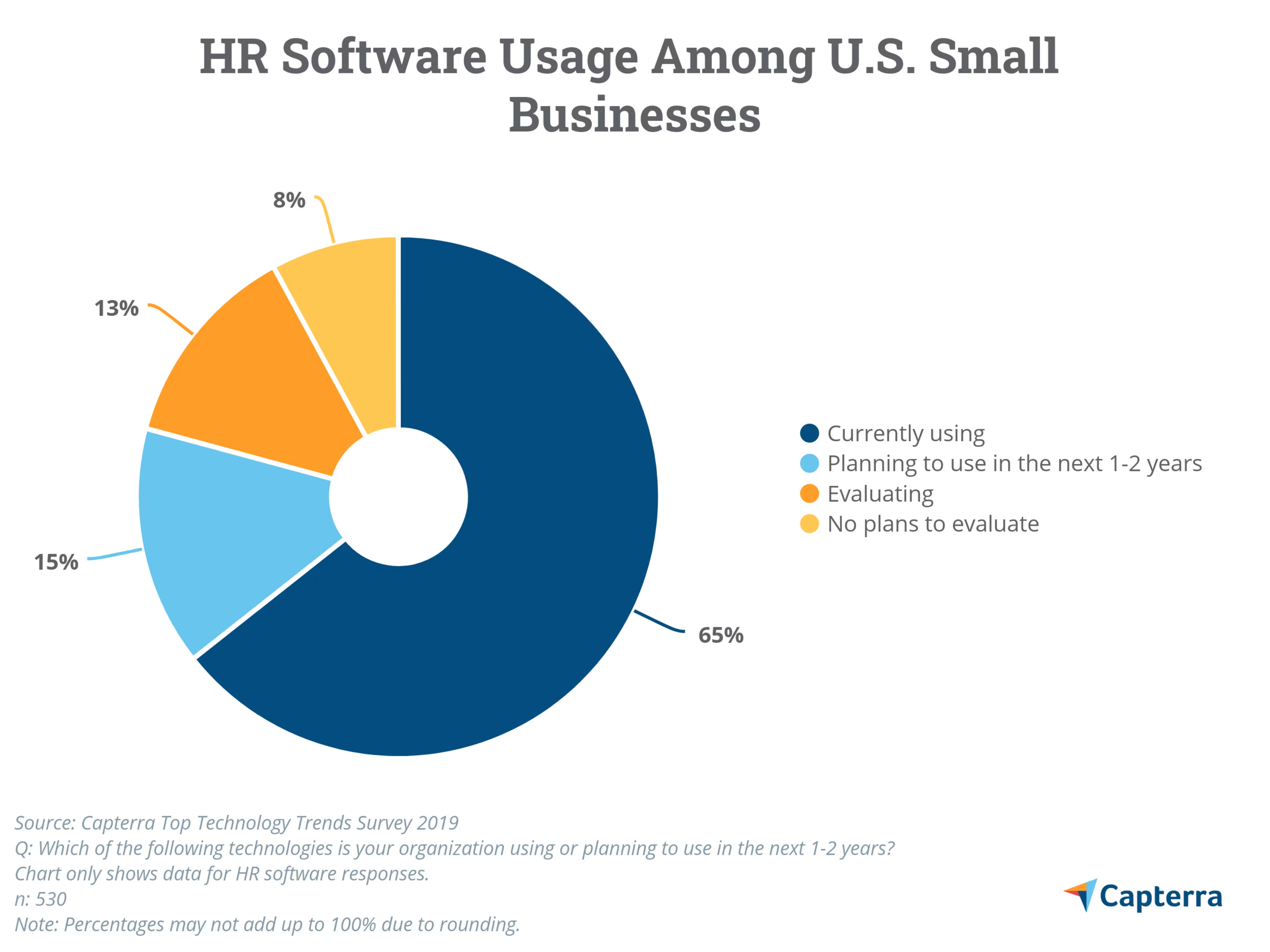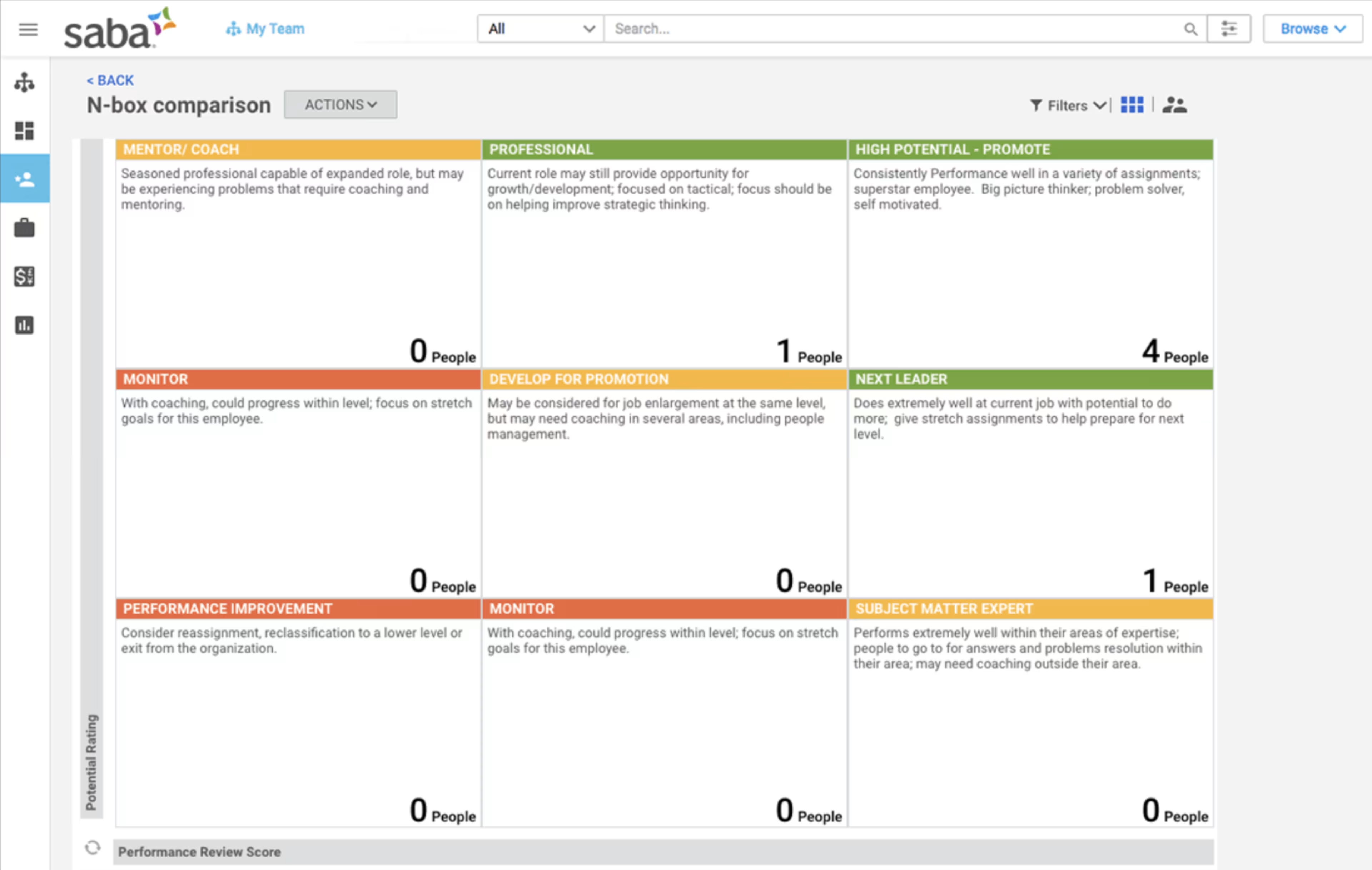Read on to find out if your HR department is ready to become a lean, mean, automated machine.
HR as we know it is constantly changing and evolving—so much so that it is incredibly difficult to keep track of every new trend that emerges. But if you look at the big picture of what’s been happening over the past decade, one major phenomenon emerges:
The HR department of old that relies on manual processes and gut-feel is on its way out, and it's being replaced by an HR department that is automated and data-driven.
This phenomenon even has a name: “HR digital transformation.” And it’s happening in businesses big and small. According to Capterra’s 2019 Top Technology Trends survey, 80% of U.S. small businesses now use HR software, or plan to use it in the next one to two years. These are businesses that, not too long ago, relied solely on elbow grease and file cabinets to stay on top of talent needs.

If that fact has you hitting the panic button because your HR department is lagging behind, take a deep breath. This transformation can't happen overnight and it also involves checking some important boxes first. Diving into a big HR digital transformation initiative without being properly prepared is a surefire way for that initiative to hit major roadblocks, or fail entirely.
We’ll explain what an HR digital transformation is and share some steps every small business should take to prepare for it.
What is an HR digital transformation?
An HR digital transformation is the implementation and use of technology to augment an HR department’s capabilities. The goal with an HR digital transformation is two-fold: to automate HR processes in order to save time and money, and to collect and analyze data from those processes to make more data-driven decisions.
HR digital transformation can take many forms:
Instead of reading every single resume from job seekers who apply to your company, an applicant tracking system (ATS) can automatically filter out bad candidates using keywords and data from your high-performing employees.
Instead of manually walking every new hire through a bunch of onboarding paperwork, onboarding software completely automates and digitizes the process.
Instead of promoting workers based on instinct, succession planning systems can marry data on employee performance, personal career goals, and organizational skills gaps to give teams more information to inform their promotion decisions.
You get the gist. It’s transforming HR—payroll, recruiting, compliance, learning and performance management, everything—from what it used to be (paper-driven, with decisions based on instinct and opinion), to what it needs to be to excel in the modern business world (technology-driven, with decisions based on hard data).

Succession planning in Saba (Source)
What sounds simple in principle, though—digitizing an HR process—is actually incredibly complex. Each implementation is its own mountain to climb: defining a goal, identifying the people and resources you need, getting leadership buy-in, researching and making a technology purchase, doing the setup, preparing your organization for the change, testing, optimizing, and ruling if the project was a success or failure.
You also have to factor how each of these mountains fit together to create your HR ecosystem. These technologies inform one another, after all—your attendance data is used to calculate payroll, your hiring needs affect your workforce planning needs, etc. Without a sound transformation strategy and a thorough integration process, one botched implementation could bring the whole ecosystem crashing down.
All that to say, an HR digital transformation is a complex and demanding undertaking, and many businesses—despite the urgency to “get with the times”—simply aren’t prepared to make this transition.
5 boxes you should tick before HR digital transformation
For many businesses, the clock is ticking on going digital. In a Gartner survey, 67% of business leaders said that if their company did not become significantly more digitalized this year, it would no longer be competitive.
That being said, businesses shouldn’t rush into this. Before you take on an HR digital transformation project, make sure you tick these five boxes:
You have a human resources information system (HRIS). An HRIS is the foundation upon which all HR digital transformation initiatives are built. It’s the core HR software used to maintain a database of your employees. Outside of any recruiting systems, every implementation will rely on the employee data in your HRIS to operate. If you don’t currently have an HRIS, click here to explore your options.
You have at least 50 employees. Take this one with a grain of salt, since every business is different. But typically, you won’t get the economies of scale and return on investment you need with a major HR digital transformation initiative until you hit the 50-employee mark. It is not a coincidence that this is the same size at which many employee benefits requirements come into play—businesses are presented with more administrative hurdles and needs that a digital transformation could abate.
You have a formal IT department. Between integration needs, data security precautions, and a thousand other logistical hurdles you have to consider with digital transformation, an IT department—even just a solo IT director or CIO—is a must. They will be your partner in laying out your transformation strategy and process.
You are comfortable with data. Gathering tons of employee data is pointless if you don’t have the skills to interpret it, or are uncomfortable making decisions based on what the data says. This is a widespread issue: Only 33% of employees feel confident in their data literacy skills.
You have a clear internal goal in mind. Pursuing an HR digital transformation just to “modernize” or because your competitors are doing it is the wrong move. Every transformation project should have a clear internal goal related to HR processes or the employee experience with measurable outcomes you can use to deem the transformation successful or not (e.g., reducing time-to-hire by 10 days).
Digital transformation is never complete
Even if you invest in a comprehensive talent management suite to digitize your entire HR department, know this: Your transformation is not over. The truth is it never is. More advanced technologies such as artificial intelligence (AI) and virtual reality (VR) that bring a ton of benefits and build off what came before it are being innovated all the time.
That's all the more reason to build a solid foundation today. If you’re still relying on paper files or spreadsheets for a majority of your HR needs, head to our HR software page to compare top-rated affordable options.
If you’re looking for more resources like this one to help you prepare your business, check these out:
3 Ways Employees Can Derail Implementing a New System in the Workplace
Is Technostress Burning Out Your Workforce? 5 Things to Do About It